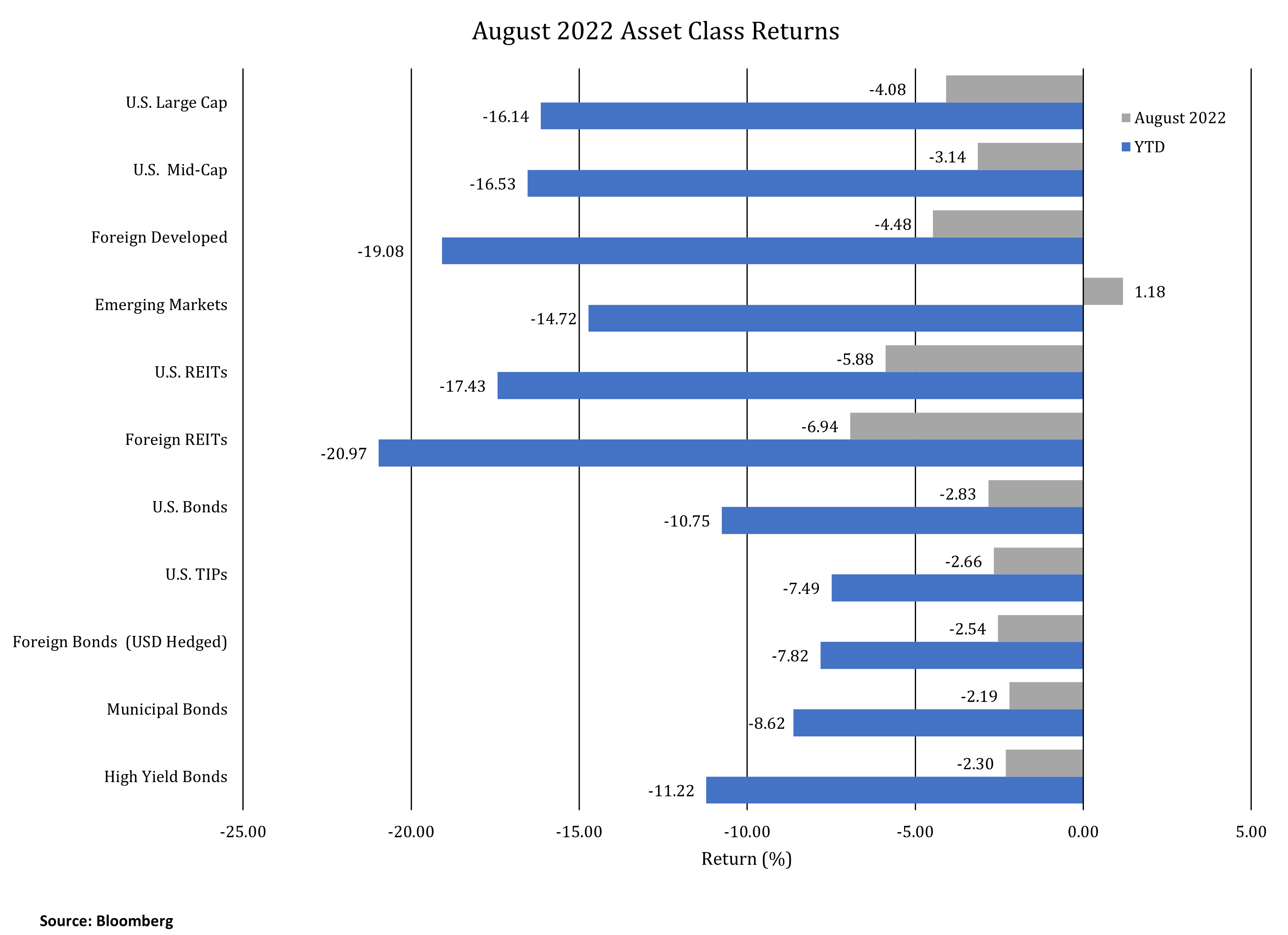
Late Economic Cycle Commentary
INVESTMENT COMMITTEE COMMENTARY August 2022
Inflation remains high and the Federal Reserve (Fed) knows U.S. money supply growth, which surged a historic 25% between 2020-2021, must be curbed further if inflation is to moderate.
Fed Chair Jerome Powell announced an increase in short-term interest rates of 0.75% in July and commented the Fed was committed to reducing the high level of inflation. Investors were positive on Powell’s comments at that time and both equities and fixed income investments rallied.
However, speaking from a central bank symposium on August 26th, Powell presented a more hawkish tone saying the Fed must continue raising interest rates and keep at it until the job is done. This could “require a sustained period of below-trend growth”. Investors had been hoping the Fed would slow its rate tightening sooner and Powell’s comments squashed any hopes of a near-term Fed pivot. As a result, equities and fixed income investments fell sharply, reversing much of the July gains.
Of note, some emerging markets (EM) central banks which had been preemptively raising interest rates earlier than developed countries were able to slow rate increases. China and Turkey cut rates. As a result, EM equities performed better than developed countries.
In August, the S&P 500 and foreign developed equities dropped 4.1% and 4.5%, respectively. Emerging market (EM) equities gained 1.2%. For the month, the yield on 10-year Treasuries rose from 2.64% to 3.13%. As a result, intermediate investment grade bonds fell 2.8%.

Late Economic Cycle Commentary
Inflation has been and continues to be a key driver of Fed policy, fiscal policy, investor uncertainty and short-term investment performance. The following are recent months’ year-over-year, non-seasonally adjusted inflation rates.

Of note, the inflation rates of the selected components are still high and trending higher, particularly housing and food. The data shows inflation is stubbornly problematic leading to Chair Powell’s most recent comments.
The Inflation Reduction Act of 2022 was signed into law by President Biden on August 16th. Despite the name, the Congressional Budget Office estimates the law will have “a negligible effect” on curbing inflation in 2022 and 2023. With a key focus on policies related to climate, tax, semiconductor and technology research, the law includes a 15% corporate minimum tax rate on corporations with income of at least $1 billion. Additionally, corporate stock buybacks will face a 1% excise tax. JP Morgan estimates the additional taxes will reduce S&P 500 earnings growth by 3% in 2023.
Other late cycle economic reports have shown both negative and positive trends. Monthly single family housing permits and starts have fallen since February by about 25%. The National Federation of Independent Business Optimism Index has also trended lower over 2022. However, employment numbers remain sound. Nonfarm payrolls are now above pre-pandemic levels. Unemployment ticked up slightly to 3.7% in August which was due, in part, to the largest increase in the U.S. labor force in 2022.
Late-stage economic cycles, by their nature, exhibit greater market volatility. Current uncertainties may dissipate as we get more reports showing the economy is normalizing and as more companies are calling workers back to the office. Thereafter, the recession does not have to be deep, but that will depend on how quickly inflation can drop and how much earnings and employment can hold up. With current uncertainties, now is not the time to be adding risk to investment portfolios. However, strategic neutral equity weightings are appropriate. Investors are encouraged to maintain discipline while avoiding urges to react to short-term market noise.
If you have any questions, you should consult with your JMG Advisor.
Important Disclosure
Please remember that past performance may not be indicative of future results. Different types of investments involve varying degrees of risk, and there can be no assurance that the future performance of any specific investment, investment strategy, or product (including the investments and/or investment strategies recommended or undertaken by JMG Financial Group Ltd. (“JMG”), or any non-investment related content, made reference to directly or indirectly in this writing will be profitable, equal any corresponding indicated historical performance level(s), be suitable for your portfolio or individual situation, or prove successful. Due to various factors, including changing market conditions and/or applicable laws, the content may no longer be reflective of current opinions or positions. Moreover, you should not assume that any discussion or information contained in this writing serves as the receipt of, or as a substitute for, personalized investment advice from JMG. To the extent that a reader has any questions regarding the applicability of any specific issue discussed above to his/her individual situation, he/she is encouraged to consult with the professional advisor of his/her choosing. JMG is neither a law firm, nor a certified public accounting firm, and no portion of the content provided in this writing should be construed as legal or accounting advice. A copy of JMG’s current written disclosure Brochure discussing our advisory services and fees is available upon request. If you are a JMG client, please remember to contact JMG, in writing, if there are any changes in your personal/financial situation or investment objectives for the purpose of reviewing/evaluating/revising our previous recommendations and/or services, or if you would like to impose, add, or to modify any reasonable restrictions to our investment advisory services. JMG shall continue to rely on the accuracy of information that you have provided.
To the extent provided in this writing, historical performance results for investment indices and/or categories have been provided for general comparison purposes only, and generally do not reflect the deduction of transaction and/or custodial charges, the deduction of an investment management fee, nor the impact of taxes, the incurrence of which would have the effect of decreasing historical performance results. It should not be assumed that your account holdings correspond directly to any comparative indices. Indices are not available for direct investment. Market Segment (index representation) as follows: U.S. Large Cap (S&P Total Return); U.S. Mid-Cap (Russell Midcap Index Total Return); Foreign Developed (FTSE Developed Ex U.S. NR USD); Emerging Markets (FTSE Emerging NR USD); U.S. REITs (FTSE NAREIT Equity Total Return Index); Foreign REITs (FTSE EPRA/NAREIT Developed Real Estate Ex U.S. TR); U.S Bonds (Bloomberg US Aggregate Index); U.S. TIPs (Bloomberg US Treasury Inflation-Linked Bond Index); Foreign Bond (USD Hedged) (Bloomberg Global Aggregate Ex US TR Hedged); Municipal Bonds (Bloomberg US Municipal Bond Index); High Yield Bonds (Bloomberg US Corporate High Yield Index).
